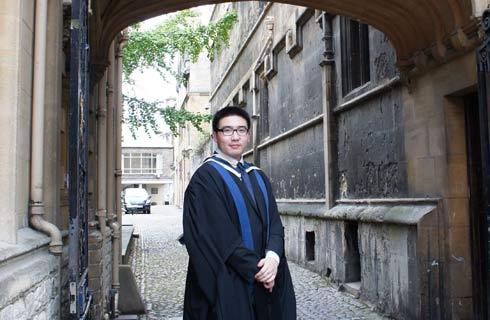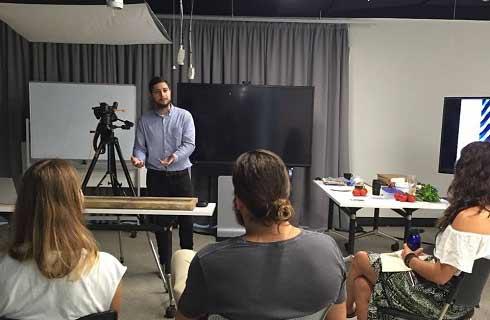- IDP China>
- 课程库>
- 工程与技术>
- 工程学及其相关技术>
- 其他工程及相关技术>
- Master of Engineering Master of Engineering Management - Biomedical Engineering
工程学硕士工程管理硕士-生物医学工程
Master of Engineering Master of Engineering Management - Biomedical Engineering

学历文凭
Masters Degree (Coursework)

专业院系
Faculty of Engineering and Information Technology

开学时间

课程时长

课程学费

国际学生入学条件
IDP—雅思考试联合主办方

雅思考试总分
- 雅思总分:
- 托福网考总分:
- 托福笔试总分:
- 其他语言考试:
CRICOS代码: 081095F
申请截止日期: 请与IDP联系 以获取详细信息。
课程简介
This program allows students to complete the Master of Engineering (ME) and the Master of Engineering Management (MEM) in two years of full-time study. The course follows an integrated approach to professional practice through professional engineering subjects, subjects relating to the major, an independent graduate project (in the area of the major), and a set of electives. This course is for professional engineers who want to combine the Master of Engineering with a specific major with the Master of Engineering Management. This enables students to gain both technical and management skills in an accelerated way and complete two courses in two years rather than three years individually.Biomedical engineers apply knowledge of engineering to the design and development of medical related products and systems. More specifically, biomedical engineers are responsible for developing biosensors, medical and physiological monitoring devices, prosthetic devices and artificial organs, physiological modelling, biomechanics or other assistive instrumentation. They are also increasingly engaged in conducting research that aims at improving the early detection of diseases, analyzing DNA sequence data.The biomedical engineering major will provide students with advanced knowledge of this discipline. Through practice-oriented learning, this major will help students develop the essential knowledge and skills specialised in Genomics and Bioinformatics, or 3D Bio nanotechnology or Bio-instrumentation. Graduates will have the opportunity to develop skills in using 3D CAD design (Solidworks), prototyping, building nano devices, designing sensors, molecular diagnostics (PCR and sequencing), bioinformatics and printing biomaterials applicable to improve human health. Subjects are being taught in an interactive, and studio-like format, which is focused on industry informed problems.Students who hold an undergraduate engineering degree are able to enhance their ability and knowledge through postgraduate-level studies in their respective majors, and gain knowledge and skills that enhance their ability to progress to engineering management roles.
相关申请
 预科
预科 奖学金
奖学金 实习机会
实习机会 在校学习
在校学习 跨境学习
跨境学习 校园授课-线上开始
校园授课-线上开始 在线/远程学习
在线/远程学习
开学时间&学费
学费信息仅供参考,请与IDP联系以获取详细信息
| 开学时间 | 时长 | 学费 | 地点 |
|---|
学校排名

世界排名196
数据源:
泰晤士高等教育世界大学排名
关于悉尼科技大学

悉尼科技大学(UTS)是世界排名前100的大学之一(QS 2025),对于任何希望提升职业前景并在充满活力的环境中学习的学生来说,这都是一个很好的选择。UTS的学位包括实地考察、案例研究和其他实践经验。学科与行业相结合,为学生提供相关技能。研究项目将学生与所在领域的顶尖人才联系起来。作为一所高级研究型大学,学生可以向在各自行业提供丰富经验的专家学习。该大学提供相应的设施,其空间旨在模拟所有学院学生的真实工作环境。UTS位于悉尼市中心,悉尼是世界第六大学生城市(QS 2025)。在这里,学生们可以轻松地在学习、工作和休闲之间切换。UTS就在中央车站旁边,所以学生们可以跳上火车或公共汽车在城市里四处逛逛,享受悉尼提供的一切。UTS提供: 国际学生支持中心 英语语言与学习支持服务 职业服务 医疗和心理健康支持 住宿支持 180多个学生俱乐部
本校相关课程

全球研究学士
学历文凭
Bachelor Degree
开学日期
课程费用总额


信息技术科学学士学位
学历文凭
Dual Degree
开学日期
课程费用总额


网络工作研究生证书
学历文凭
Graduate Certificate
开学日期
课程费用总额


音乐与声音设计学士国际研究文学士
学历文凭
Dual Degree
开学日期
课程费用总额


音乐和声音设计学士学位
学历文凭
Bachelor Degree
开学日期
课程费用总额


室内建筑设计学士学位
学历文凭
Bachelor Degree
开学日期
课程费用总额

其他相关课程

工程四级证书
 希拉巴克斯特培训中心(私立)
希拉巴克斯特培训中心(私立)学历文凭
Certificate IV
开学日期
课程费用总额


工程四级证书-制造
 霍姆斯格兰职业技术学院
霍姆斯格兰职业技术学院学历文凭
Certificate IV
开学日期
课程费用总额


设计文凭(UniLink)(8个月)
 斯威本科技大学
斯威本科技大学泰晤士高等教育世界大学排名:282
学历文凭
Unilink Diploma
开学日期
课程费用总额


专业工程学硕士(生物医学)
 悉尼大学
悉尼大学泰晤士高等教育世界大学排名:54
学历文凭
Masters Degree (Coursework)
开学日期
课程费用总额


工程科学学士
 伊迪斯科文大学
伊迪斯科文大学学历文凭
Bachelor Degree
开学日期
课程费用总额


细木工三级证书
 霍姆斯格兰职业技术学院
霍姆斯格兰职业技术学院学历文凭
Certificate III
开学日期
课程费用总额










